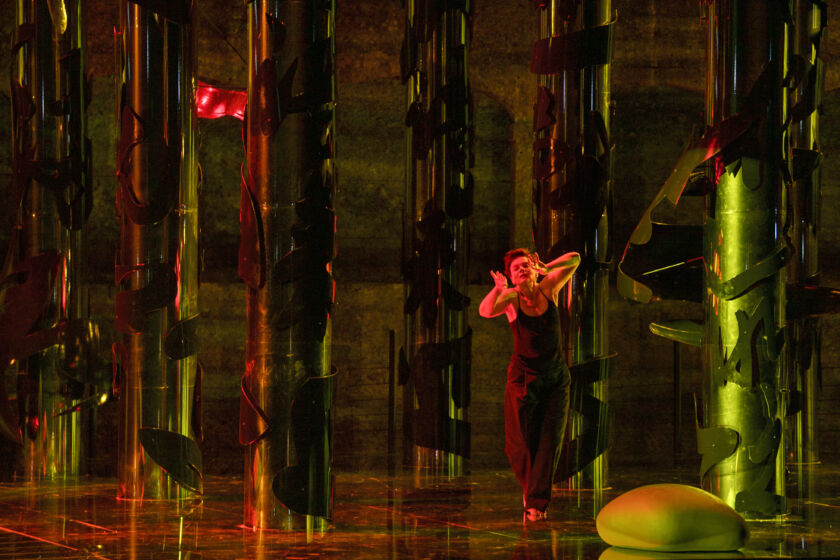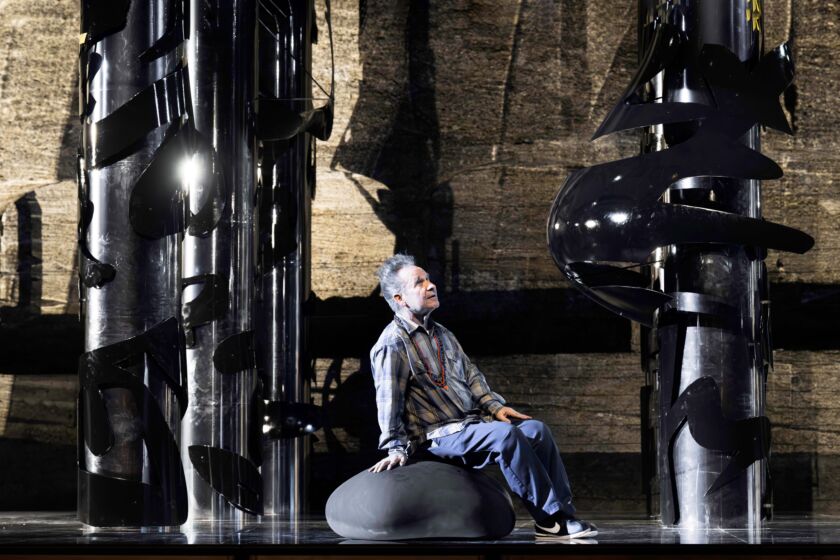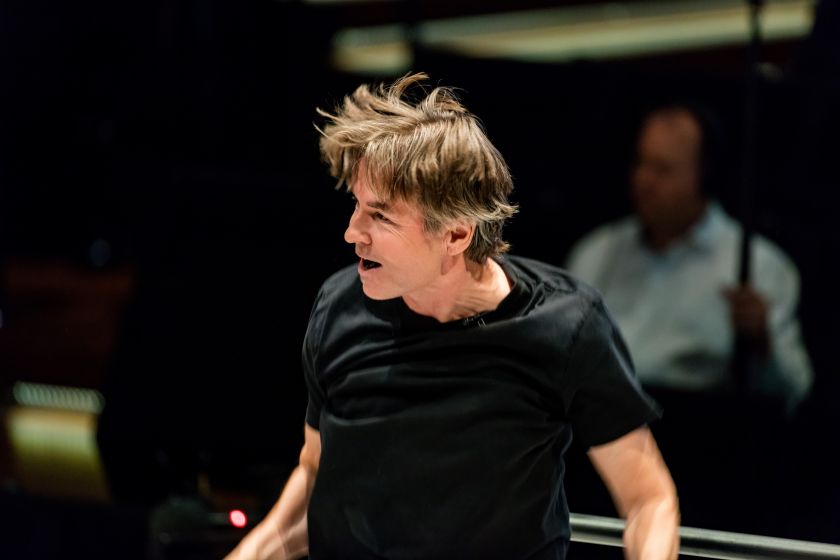Deafening Whispers
Peter Sellars and Esa-Pekka Salonen combine Arnold Schoenberg’s monodrama Erwartung with Der Abschied from Gustav Mahler’s symphony Das Lied von der Erde in their new project One Morning Turns into an Eternity.

Esa-Pekka Salonen has just arrived in Los Angeles after acclaimed performances of Mussorgsky, Sibelius, and Mahler’s Third Symphony at the Easter Festival. Peter Sellars is already waiting for him. They’ve just had lunch together, but haven’t yet really discussed their joint project for the Salzburg Festival: One Morning Turns into an Eternity. The two know each other very well. Since their collaboration on Olivier Messiaen’s Saint François d’Assise at the Salzburg Festival in 1992, they’ve worked together regularly. Salonen himself calls Sellars his “most frequent and most important partner in the world of staged and musical theater.”
Now they are sitting in a sunlit artist’s room with mint green accents, in front of the computer: Salonen in his relaxed, slightly tousled LA look, cosmopolitan and charming with more than a hint of Pierce Brosnan and a touch of friendly irony. Next to him, Sellars—like Puck from A Midsummer Night’s Dream — with his trademark spiky hair, mischievous, and full of warm, disarming yet serious enthusiasm.

How did the project One Morning Turns into an Eternity come about? How does one combine Arnold Schoenberg’s Erwartung (Expectation) with Der Abschied (The Farewell) from Mahler’s Das Lied von der Erde (The Song of the Earth)?
Peter Sellars: Markus Hinterhäuser approached me with the idea of staging Erwartung. The discussions went on for years. But it still needed a companion piece. Eventually, Markus suggested Mahler’s Farewell—at a time when he was probably working on it as a pianist. And, as always when you talk to Markus, you’re talking to a true musician; someone who not only has taste but also deeply felt emotions and a highly nuanced relationship with musical language. This is a program that only a full-blooded musician would propose. And when he made the suggestion, I was immediately enthusiastic. The inner connections are wonderfully deep. And the broader associations—from Vienna in 1909 to today, across the whole world—are extraordinary. Really powerful stuff.
Operas with an inherent dramatic core are one thing. But you seem to have a real knack for staging the seemingly unstageable—whether it’s the St. John Passion, Mozart’s Zaide, or now Der Abschied…
Peter Sellars: …or our first collaboration at the Felsenreitschule, Saint François d’Assise, which brought us into this building together 30 years ago. For me, it’s a tempting opportunity to explore how music—often outside the core repertoire—becomes dramatic. Or, even more interestingly, how drama becomes musical. Especially when the questions are mysterious and the answers aren’t obvious.
Is it, in a way, even easier to stage an “abstract” programme than, say, a Janáček opera, which is inherently dramatic like something by Ibsen or Chekhov?
Peter Sellars: The word “easy” doesn’t exist in this context. Nothing is easy. Everything is difficult, in its own way. And this programme is insanely challenging. Yes, it’s short. But from the very first bar, a whole series of existential questions arise. You really have to venture into difficult terrain. It’s a true challenge—for the performers and for the audience. But that’s the concept of classical music: that we take on the challenges precisely for that reason—and then discover something we didn’t know before.

Is it different to conduct a classical stage production, say, of Tristan und Isolde, compared to one with video projections by Bill Viola? Or a concert hall piece like Der Abschied in a staged version?
Esa-Pekka Salonen: I think the environment in which music is performed inevitably demands attention and provokes a response. Whether that response is conscious or unconscious varies. But when I conduct these two works in a staged production, I obviously want to know, musically speaking, what role I’m playing and what my contribution to the dramaturgy is, what the underlying concept is, and what we want to express. So the short answer is: Yes—it influences my approach to the music. I did Erwartung just last year in a semi-staged version with Peter in San Francisco, so I have a rough idea of what to expect. But performing Das Lied von der Erde on stage is new territory for me, and I’m very excited about it.
Have you already made specific plans?
Peter Sellars: We haven’t discussed it in detail yet—we only met an hour ago. But we already have some ideas floating around. It’s especially interesting to look at Mahler from a new perspective. The fact that someone whose main job was conducting operas so studiously refused to write one is fascinating. Especially since operatic language was present in every fiber of his being. And then, as is well known, Mahler always composed outdoors, in nature, with an incredible view from his composing huts and sounds near and far. Behind a proscenium on a concert stage, this music can become a bit two-dimensional. That’s why it’s incredibly exciting to bring this piece to the Felsenreitschule, directly to the mountain.
And how do these two works connect?
Esa-Pekka Salonen: For one, it’s fascinating how close in time the two were composed—towards the end of the first decade of the 20th century. Freud publishes The Interpretation of Dreams. Einstein develops the theory of relativity. Suddenly, people’s certainties about their world are being questioned. Uncertainty has, in a way, become official. That must have had an effect on creative minds. Mahler seems to close a chapter in music history, Schoenberg opens a new one.
And then both pieces are about loss, about searching, about the unreliability of memory—and how memory can be so painful that it must not be too precise. Both deal with silence and musical question marks. Especially with Mahler, the most expressive moments are the quietest. And with Schoenberg, there are passages where you can hardly hear the orchestra at all. Sure, both can be loud too. But the most important things in life are rarely shouted. A whisper is much more suited to the essential moments.
Text: Jens F. Laurson
Translated from German
First published on 31.05.2025 in Die Presse Kultur Spezial: Salzburger Festspiele
